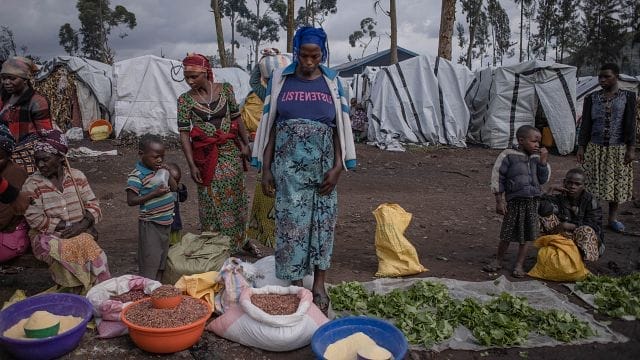
In the heart of the North Kivu province, where the echoes of displaced lives resonate, Dani Rukara stands among nearly seven million Congolese uprooted within Africa's second-largest country—a staggering record, as noted by the United Nations.
While other regions of the Democratic Republic of Congo are immersed in the fervor of general elections, the Kanyaruchinya camp bears witness to a different struggle.
In this sea of displacement near Goma, placards echo the urgency of the December 20 elections, underscoring President Felix Tshisekedi's battle against escalating insecurity.
Despite promises made over the past five years, Rukara reflects on unfulfilled hopes, stating, "Now we hope that the new president elected will put an end to this unbearable war, allowing us to return to our villages."
Having fled from the M23 rebel activity in Rutsuchuru, some 60 km north of Kanyaruchinya, Rukara expresses the silent plea of those denied their right to vote. In regions like Masisi, the absence of voting further intensifies the struggle.
President Tshisekedi, seeking re-election at 60, has vowed to address the pervasive insecurity. However, after half a decade in power, the situation in eastern DRC has worsened, marked by civilian casualties and widespread sexual violence against women.
Deogracias Ntamuhanga, feeling the weight of forced disenfranchisement, emphasizes, "I have to vote because I have the right to, and I must vote for someone deserving." The painful memory of past elections haunts, leading to a collective desire for security.
Esperance Nyiraneza, resigned yet hopeful, reflects on the complex emotions of being unable to vote. "I'm angry because I won't be able to vote, but I'd like Tshisekedi to stay, because it's thanks to him that we're here." The looming threat of M23 adds urgency to the plea for political stability.
Amidst the political turmoil, rampant inflation further challenges Tshisekedi's popularity in the region. Eastern DRC remains a battleground for armed groups, a haunting legacy of wars from the 1990s and 2000s.
The M23, seizing territory since late 2021, has displaced over a million people. Accusations of Rwandan support, vehemently denied by Kigali, intensify the complexity of the situation.
As presidential candidates traverse eastern DRC, promises to restore peace resonate. However, the grim reality, as outlined by Doctors Without Borders, paints a stark picture—tens of thousands of families continue to flee violence in North Kivu, underscoring the dire need for lasting solutions.